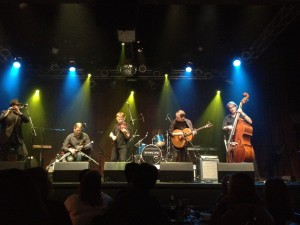Extending Tradition: The Klezmatics Present at the Highline Ballroom
Had you popped your head into the Highline Ballroom in New York City at various points throughout the evening on January 9th, and not read the fine print, you’d probably have assumed you’d stumbled into three different shows. However, the music was, in fact, all part of one program: The Klezmatics Present. The featured acts—Les Chauds Lapins, Lúnasa and the Klezmatics—were as musically different from each other as foie grois, fadge and gribenes.
Opening was the Brooklyn group with a French name, Les Chauds Lapins, literally, “the hot rabbits.” The frontman, Kurt Hoffman, explained the name something like this: imagine Dominique Strauss-Kahn at a high school prom, and that’s what a hot rabbit connotes in France. But the rabbits can also play, it turns out, with Hoffman on ukulele, partner Meg Reichardt on guitar, and vocals shared between them. Their entire repertoire (at least what they played of it on Monday evening) consists of French swing from the prewar era. With their stated goal, “to reclaim the songs from Paris which were so influenced by Tin Pan Alley,” pieces by Django Reinhardt and Jean Trenchant, among others, were reworked into spare café swing.
Hoffman appeared on stage wearing something like a red zoot suit and a mother-of-pearl cravat against a patriarch purple shirt, but that outfit contained, perhaps, the most electricity of their set; their play was consistently pleasant, if not always terribly varied, and a bit too intimate for a space as large as the Highline. “Probably 90 percent of French love songs are about love that went wrong,” said Hoffman at one point. The audience, who appreciated the music but didn’t seem to be moved by it, undoubtedly would have been satisfied with less copious proof.
Next was Lúnasa [an interview with band member Kevin Crawford follows this review]. This five-member group has garnered more awards in their 15-year existence than you can count on three hands, the most recent of which is “Performers of the Decade” by liveireland.com. Their sound is a tidal wave of traditional Irish tinted with bluegrass and jazz, and they created an energy that easily overtook the room.
One of the highlights of their set was “The Last Pint,” their version of a song written by Pierre Bensusan, a French-Algerian guitarist who’d come to Ireland looking for inspiration only to realize he’d arrived during St. Patrick’s Day season, when any Irish musician worth his salt is making a buck in America. Sandwiched between faster tunes, Lúnasa played Bensusan’s composition with three low whistles, and the unhurried pace provided something like a freeze-frame for the listener to take stock of these deft instrumentalists.
With the appearance of the Klezmatics, the evening entered its final act. The group, which formed in the East Village in 1986 and 20 years later won a Grammy for an album of songs composed around Woody Guthrie lyrics, combines horns, strings, percussions and the accordion for an Eastern European sound that is miles away from traditional shut-up-and-eat-your-borscht klezmer; yet, it is still, without a doubt, in the genre. Their trombonist, Frank London, also on keyboard, is wicked; Matt Darriau just might be the most innovative alto sax you’ll ever hear in your life. Paul Morrissett on bass, Lorin Sklamberg on vocals and accordion, Richie Barshay on percussion, and Lisa Gutkin, who fiddles and sings, are all masters in their own right.
A few songs in, Sklamberg led the band in “Shnirele, Perele.” This song, slower than most, had been taught to him, he explained, by Adrienne Cooper. Cooper, the doyen of klezmer music and a teacher to several generations of musicians, died just a few weeks ago. “Shnirele, Perele”—Yiddish for “ribbons, pearls”—is a prayer of redemption and return, and the audience was hushed while Sklamberg showcased his remarkable voice.
This was clearly a crowd familiar with the Klezmatics, and on such English-language numbers as “Gonna Get Through This World” and “Mermaid Avenue,”—both written by Guthrie—the vocals were augmented by those who’d bought tickets. The atmosphere was an intoxicating alchemy of chic décor and overpriced drinks, and summer camp fireside singing. When the group was shouted back on stage, they bid farewell with “Ale Breider,” a classic labor song, and a perennial crowd pleaser. After a long opening, featuring an out-of-this-world solo on flute by Matt Darriau, the entire room sang along.
The Klezmatics’ playing was seamlessly executed, and so unpretentiously natural, that it took some discipline to distance oneself and put a finger on what makes their sound work: while reviving “traditional” Eastern European melodies, the Klezmatics infuse them with New Orleans jazz, Celtic fiddle, and other various influences, to make one genre-busting symphony.
This is what perhaps can be said to have tied the evening together. All three of the groups—Les Chauds Lapins, Lúnasa, the Klezmatics—put their own distinct shape to their respective traditions, and borrow from other genres to make their own more vital. There are no purists among them. But then, what fun would that be?
Before the show, I had a chance to sit down and chat with Kevin Crawford, who plays flutes and whistles for Lúnasa. We discussed Natalie Merchant, ugly album covers, and New York in January, among other things.
GALO: Tell me a little bit about tonight’s show.
Kevin Crawford: It’s going to be a potpourri of various kinds of eclectic sounds. We’re doing our thing, which is basically traditional Irish with a contemporary little twist to it, given the kind of arrangements that we use, and the instrumentation that we use. We’ve done some work with the Klezmatics before: we recorded together quite recently. We both played on Natalie Merchant’s last album, Leave Your Sleep.
(Article continued on next page)

